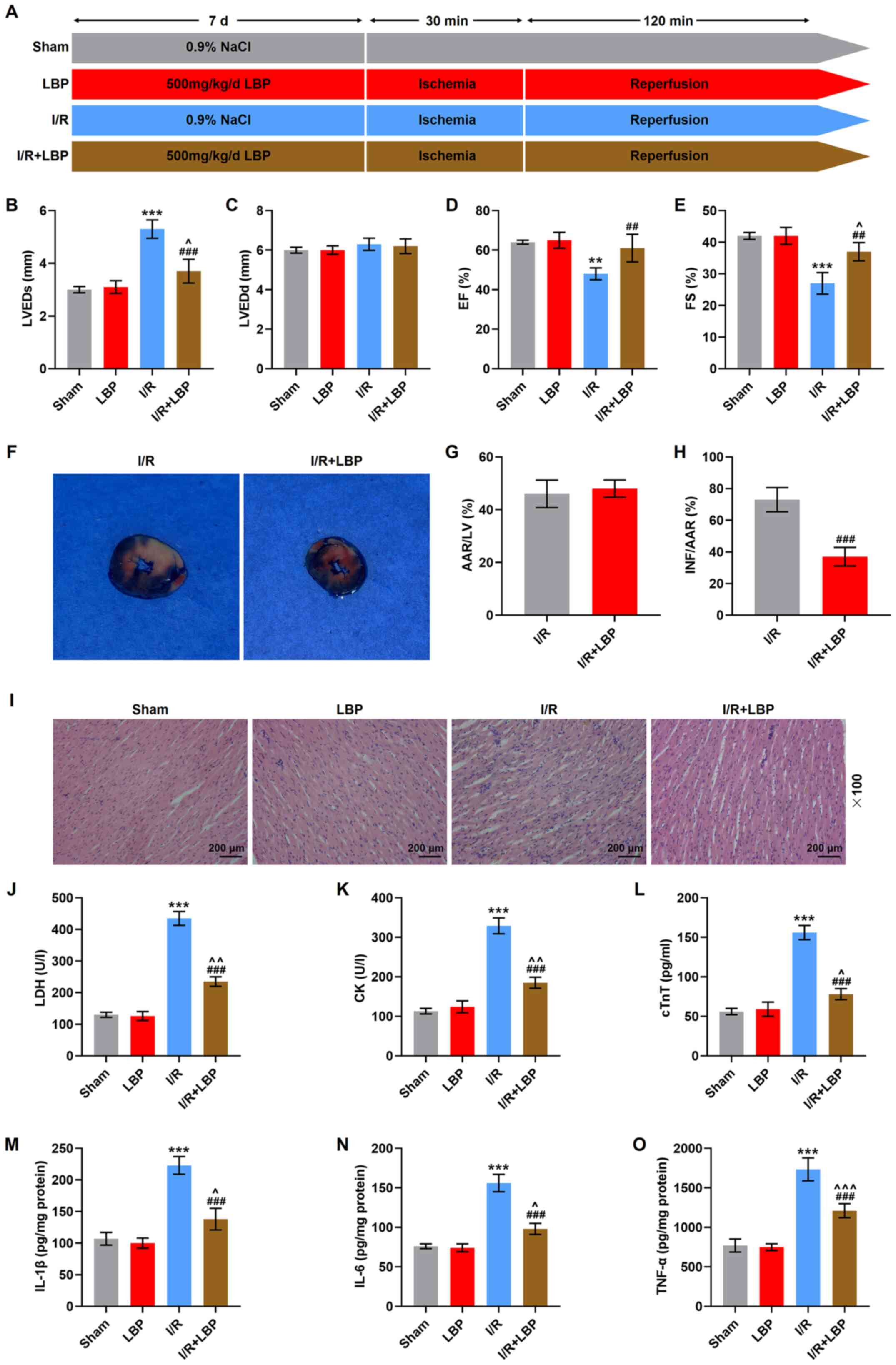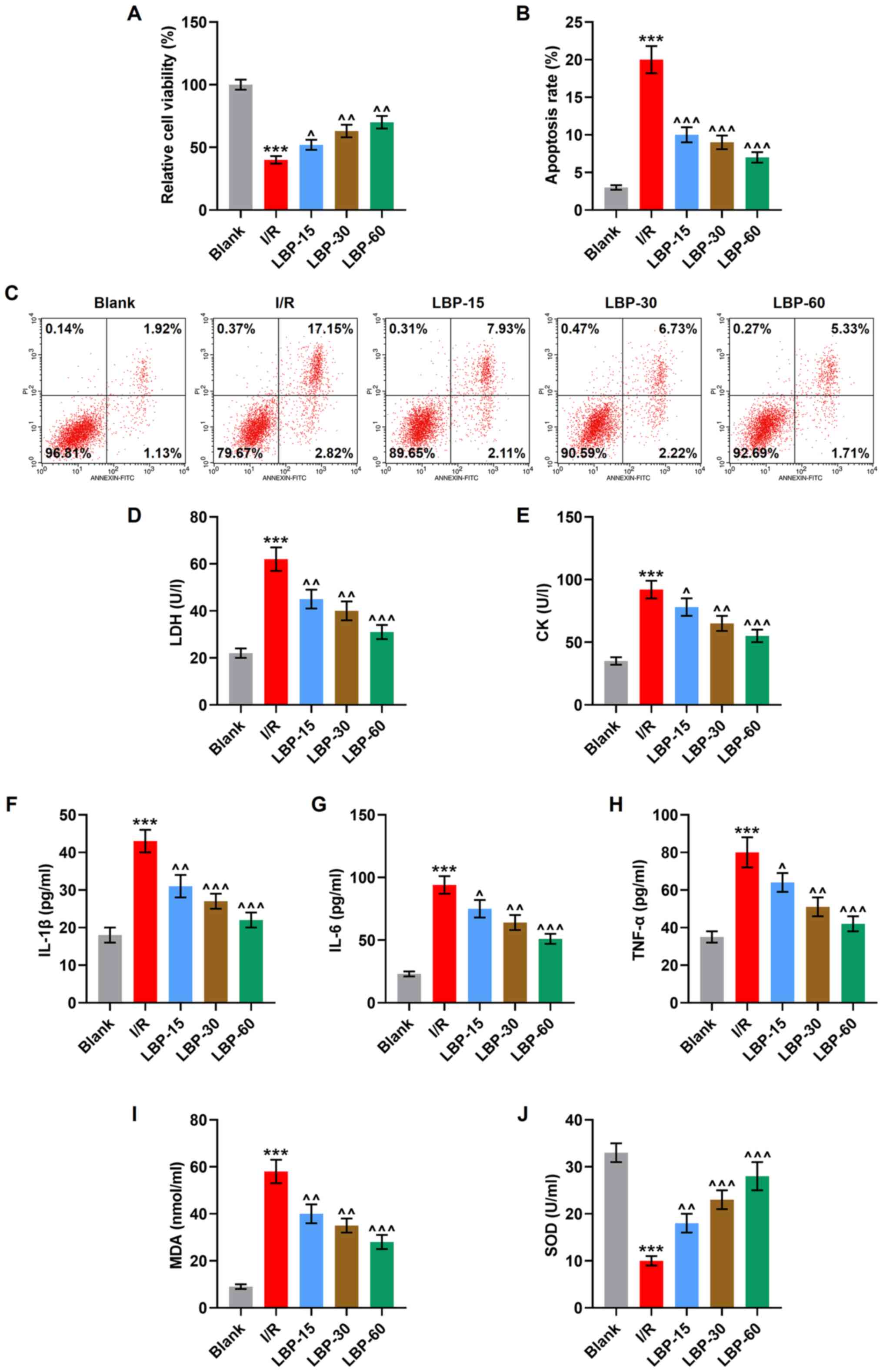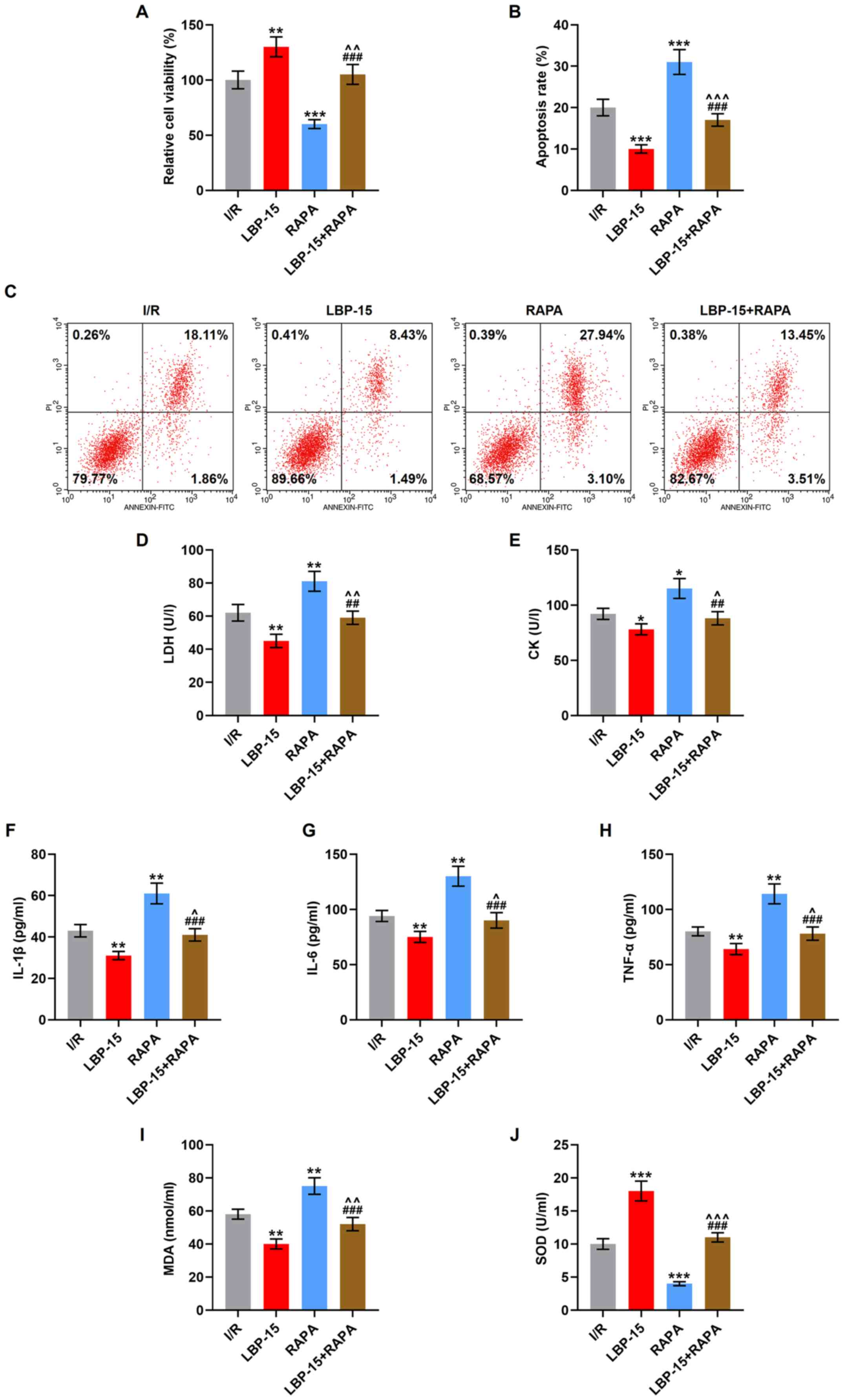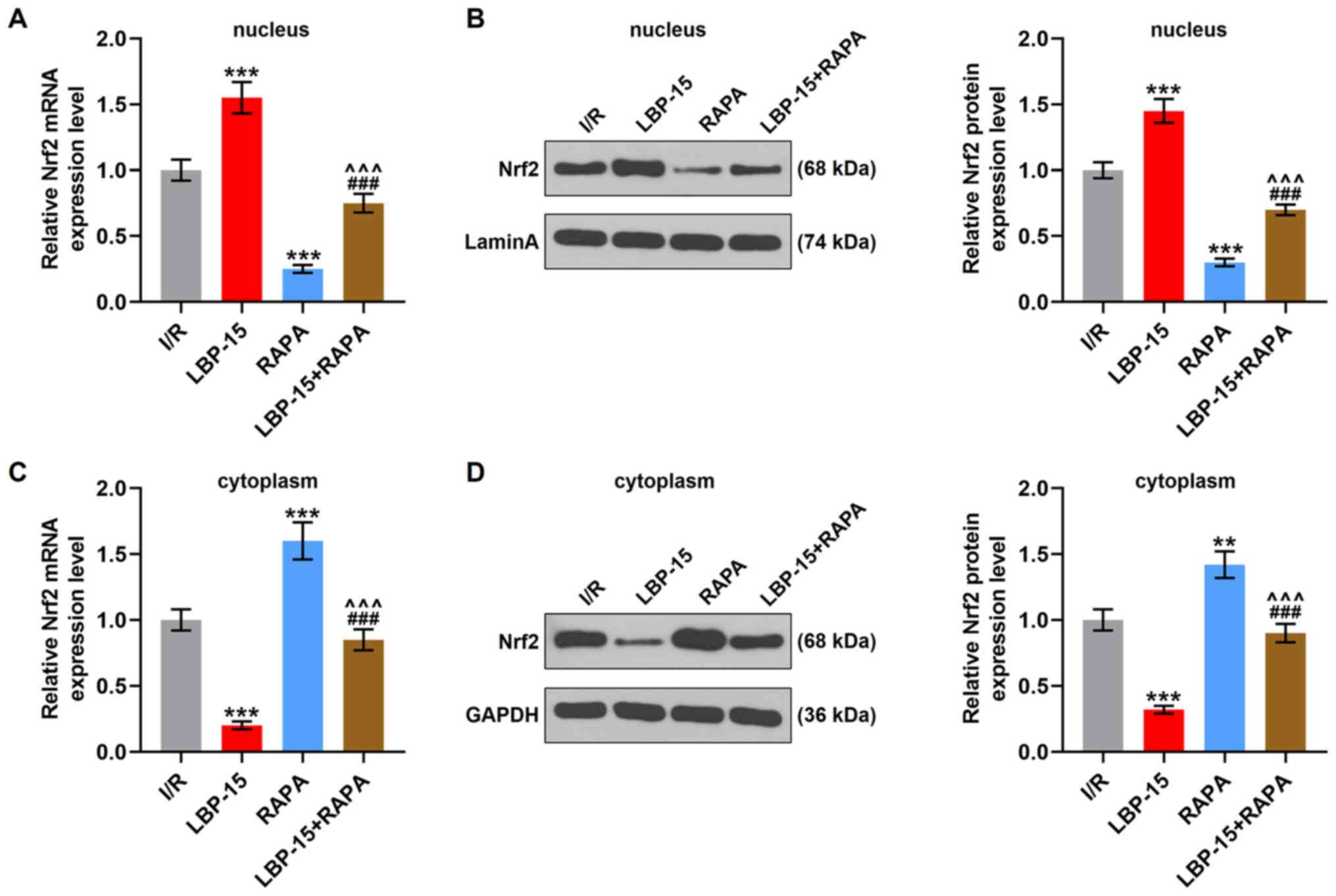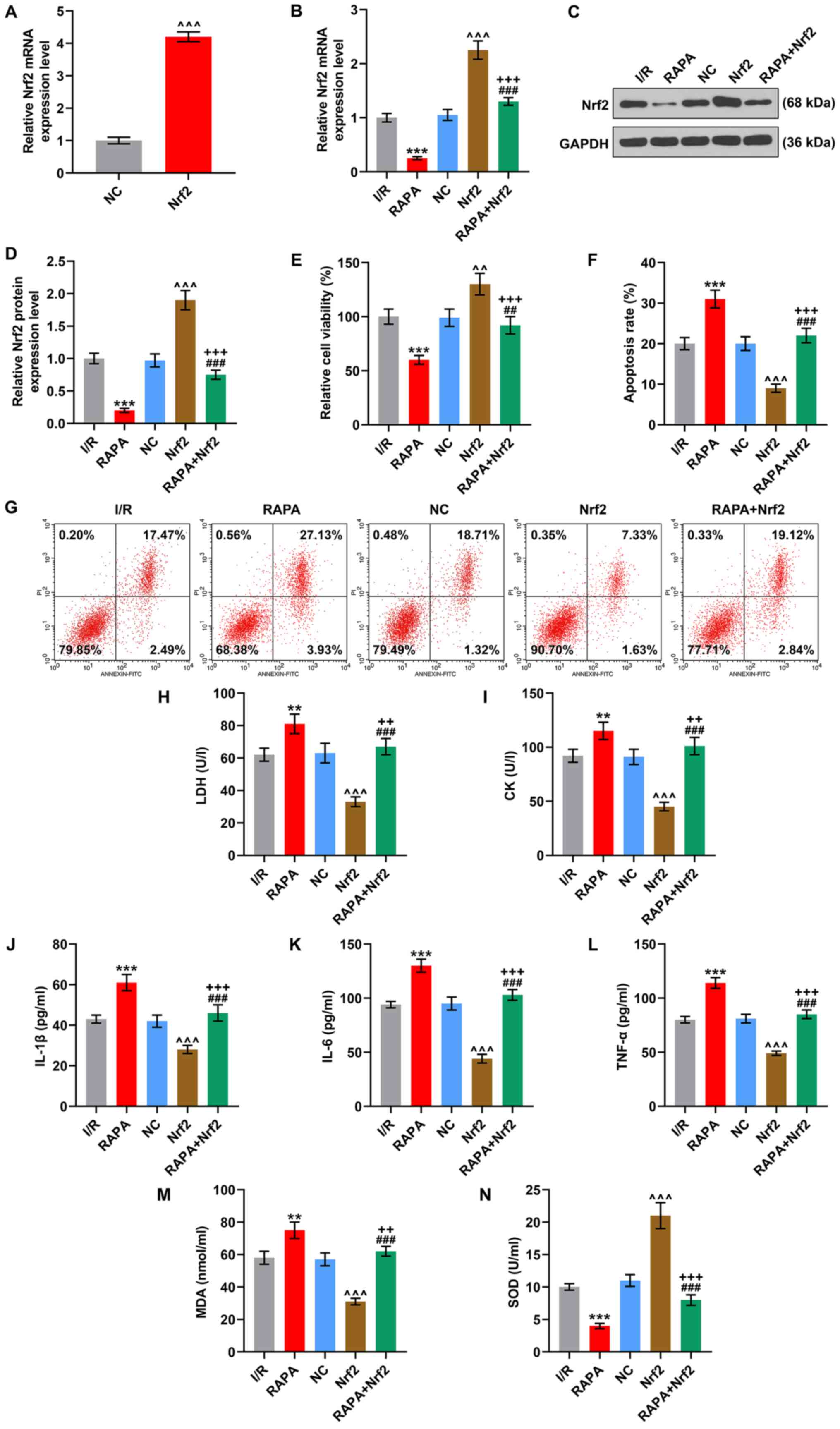|
1
|
Yellon DM and Hausenloy DJ: Myocardial
reperfusion injury. N Engl J Med. 357:1121–1135. 2007. View Article : Google Scholar : PubMed/NCBI
|
|
2
|
Lindsey ML, Bolli R, Canty JM Jr, Du XJ,
Frangogiannis NG, Frantz S, Gourdie RG, Holmes JW, Jones SP, Kloner
RA, et al: Guidelines for experimental models of myocardial
ischemia and infarction. Am J Physiol Heart Circ Physiol.
314:H812–H838. 2018. View Article : Google Scholar : PubMed/NCBI
|
|
3
|
Esposito ML, Zhang Y, Qiao X, Reyelt L,
Paruchuri V, Schnitzler GR, Morine KJ, Annamalai SK, Bogins C,
Natov PS, et al: Left ventricular unloading before reperfusion
promotes functional recovery after acute myocardial infarction. J
Am Coll Cardiol. 72:501–514. 2018. View Article : Google Scholar : PubMed/NCBI
|
|
4
|
Wu MY, Yiang GT, Liao WT, Tsai AP, Cheng
YL, Cheng PW, Li CY and Li CJ: Current mechanistic concepts in
ischemia and reperfusion injury. Cell Physiol Biochem.
46:1650–1667. 2018. View Article : Google Scholar : PubMed/NCBI
|
|
5
|
Kunecki M, Płazak W, Podolec P and Gołba
KS: Effects of endogenous cardioprotective mechanisms on
ischemia-reperfusion injury. Postepy Hig Med Dosw. 71:20–31. 2017.
View Article : Google Scholar : PubMed/NCBI
|
|
6
|
Galagudza MM, Blokhin IO, Shmonin AA and
Mischenko KA: Reduction of myocardial ischemia-reperfusion injury
with pre- and postconditioning: Molecular mechanisms and
therapeutic targets. Cardiovasc Hematol Disord Drug Targets.
8:47–65. 2008. View Article : Google Scholar : PubMed/NCBI
|
|
7
|
Yu P, Zhang J, Yu S, Luo Z, Hua F, Yuan L,
Zhou Z, Liu Q, Du X, Chen S, et al: Protective effect of
sevoflurane postconditioning against cardiac ischemia/reperfusion
injury via ameliorating mitochondrial impairment, oxidative stress
and rescuing autophagic clearance. PLoS One. 10:e01346662015.
View Article : Google Scholar : PubMed/NCBI
|
|
8
|
Li J, Xiang X, Gong X, Shi Y, Yang J and
Xu Z: Cilostazol protects mice against myocardium
ischemic/reperfusion injury by activating a PPARγ/JAK2/STAT3
pathway. Biomed Pharmacother. 94:995–1001. 2017. View Article : Google Scholar : PubMed/NCBI
|
|
9
|
Weinreuter M, Kreusser MM, Beckendorf J,
Schreiter FC, Leuschner F, Lehmann LH, Hofmann KP, Rostosky JS,
Diemert N, Xu C, et al: CaM Kinase II mediates maladaptive
post-infarct remodeling and pro-inflammatory chemoattractant
signaling but not acute myocardial ischemia/reperfusion injury.
EMBO Mol Med. 6:1231–1245. 2014. View Article : Google Scholar : PubMed/NCBI
|
|
10
|
Hou YM, Wang J and Zhang XZ: Lycium
barbarum polysaccharide exhibits cardioprotection in an
experimental model of ischemia-reperfusion damage. Mol Med Rep.
15:2653–2658. 2017. View Article : Google Scholar : PubMed/NCBI
|
|
11
|
Varoni MV, Pasciu V, Gadau SD, Baralla E,
Serra E, Palomba D and Demontis MP: Possible antioxidant effect of
Lycium barbarum polysaccharides on hepatic cadmium-induced
oxidative stress in rats. Environ Sci Pollut Res Int. 24:2946–2955.
2017. View Article : Google Scholar : PubMed/NCBI
|
|
12
|
Bo R, Zheng S, Xing J, Luo L, Niu Y, Huang
Y, Liu Z, Hu Y, Liu J, Wu Y, et al: The immunological activity of
Lycium barbarum polysaccharides liposome in vitro and adjuvanticity
against PCV2 in vivo. Int J Biol Macromol. 85:294–301. 2016.
View Article : Google Scholar : PubMed/NCBI
|
|
13
|
Zhang XJ, Yu HY, Cai YJ and Ke M: Lycium
barbarum polysaccharides inhibit proliferation and migration of
bladder cancer cell lines BIU87 by suppressing Pi3K/AKT pathway.
Oncotarget. 8:5936–5942. 2017. View Article : Google Scholar : PubMed/NCBI
|
|
14
|
Li SY, Yang D, Yeung CM, Yu WY, Chang RC,
So KF, Wong D and Lo AC: Lycium barbarum polysaccharides reduce
neuronal damage, blood-retinal barrier disruption and oxidative
stress in retinal ischemia/reperfusion injury. PLoS One.
6:e163802011. View Article : Google Scholar : PubMed/NCBI
|
|
15
|
Xiao J, Xing F, Huo J, Fung ML, Liong EC,
Ching YP, Xu A, Chang RC, So KF and Tipoe GL: Lycium barbarum
polysaccharides therapeutically improve hepatic functions in
non-alcoholic steatohepatitis rats and cellular steatosis model.
Sci Rep. 4:55872014. View Article : Google Scholar : PubMed/NCBI
|
|
16
|
Liu Q, Han Q, Lu M, Wang H and Tang F:
Lycium barbarum polysaccharide attenuates cardiac hypertrophy,
inhibits calpain-1 expression and inhibits NF-κB activation in
streptozotocin-induced diabetic rats. Exp Ther Med. 18:509–516.
2019.PubMed/NCBI
|
|
17
|
Levine B and Kroemer G: Autophagy in the
pathogenesis of disease. Cell. 132:27–42. 2008. View Article : Google Scholar : PubMed/NCBI
|
|
18
|
Xie Z and Klionsky DJ: Autophagosome
formation: Core machinery and adaptations. Nat Cell Biol.
9:1102–1109. 2007. View Article : Google Scholar : PubMed/NCBI
|
|
19
|
Tanida I, Ueno T and Kominami E: LC3
conjugation system in mammalian autophagy. Int J Biochem Cell Biol.
36:2503–2518. 2004. View Article : Google Scholar : PubMed/NCBI
|
|
20
|
Ma S, Wang Y, Chen Y and Cao F: The role
of the autophagy in myocardial ischemia/reperfusion injury. Biochim
Biophys Acta. 1852:271–276. 2015. View Article : Google Scholar : PubMed/NCBI
|
|
21
|
Wu S, Chang G, Gao L, Jiang D, Wang L, Li
G, Luo X, Qin S, Guo X and Zhang D: Trimetazidine protects against
myocardial ischemia/reperfusion injury by inhibiting excessive
autophagy. J Mol Med (Berl). 96:791–806. 2018. View Article : Google Scholar : PubMed/NCBI
|
|
22
|
Dai P, Shen D, Shen J, Tang Q, Xi M, Li Y
and Li C: The roles of Nrf2 and autophagy in modulating
inflammation mediated by TLR4-NFκB in A549 cell exposed to layer
house particulate matter 2.5 (PM2.5). Chemosphere. 235:1134–1145.
2019. View Article : Google Scholar : PubMed/NCBI
|
|
23
|
National Research Council. 2011, . Guide
for the Care and Use of Laboratory Animals. Eighth Edition.
Washington, DC: The National Academies Press; https://doi.org/10.17226/12910
|
|
24
|
Liu SY, Chen L, Li XC, Hu QK and He LJ:
Lycium barbarum polysaccharide protects diabetic peripheral
neuropathy by enhancing autophagy via mTOR/p70S6K inhibition in
Streptozotocin-induced diabetic rats. J Chem Neuroanat. 89:37–42.
2018. View Article : Google Scholar : PubMed/NCBI
|
|
25
|
Du M, Hu X, Kou L, Zhang B and Zhang C:
Lycium barbarum Polysaccharide Mediated the Antidiabetic and
Antinephritic Effects in Diet-Streptozotocin-Induced Diabetic
Sprague Dawley Rats via Regulation of NF-κB. BioMed Res Int.
2016:31402902016. View Article : Google Scholar : PubMed/NCBI
|
|
26
|
Zhao Y, Guo R, Li L, Li S, Fan G, Zhao X
and Wang Y: Tongmai formula improves cardiac function via
regulating mitochondrial quality control in the myocardium with
ischemia/reperfusion injury. Biomed Pharmacother. 132:1108972020.
View Article : Google Scholar : PubMed/NCBI
|
|
27
|
Yu Y, Wu X, Pu J, Luo P, Ma W, Wang J, Wei
J, Wang Y and Fei Z: Lycium barbarum polysaccharide protects
against oxygen glucose deprivation/reoxygenation-induced apoptosis
and autophagic cell death via the PI3K/Akt/mTOR signaling pathway
in primary cultured hippocampal neurons. Biochem Biophys Res
Commun. 495:1187–1194. 2018. View Article : Google Scholar : PubMed/NCBI
|
|
28
|
Xu Q, Li X, Lu Y, Shen L, Zhang J, Cao S,
Huang X, Bin J and Liao Y: Pharmacological modulation of autophagy
to protect cardiomyocytes according to the time windows of
ischaemia/reperfusion. Br J Pharmacol. 172:3072–3085. 2015.
View Article : Google Scholar : PubMed/NCBI
|
|
29
|
Livak KJ and Schmittgen TD: Analysis of
relative gene expression data using real-time quantitative PCR and
the 2(-Delta Delta C(T)) method. Methods. 25:402–408. 2001.
View Article : Google Scholar : PubMed/NCBI
|
|
30
|
Wallert M, Ziegler M, Wang X, Maluenda A,
Xu X, Yap ML, Witt R, Giles C, Kluge S, Hortmann M, et al:
α-Tocopherol preserves cardiac function by reducing oxidative
stress and inflammation in ischemia/reperfusion injury. Redox Biol.
26:1012922019. View Article : Google Scholar : PubMed/NCBI
|
|
31
|
Wu T, Jiang N, Ji Z and Shi G: The IRE1
signaling pathway is involved in the protective effect of low-dose
LPS on myocardial ischemia-reperfusion injury. Life Sci.
231:1165692019. View Article : Google Scholar : PubMed/NCBI
|
|
32
|
Amani M, Jeddi S, Ahmadiasl N, Usefzade N
and Zaman J: effect of HEMADO on level of CK-MB and LDH enzymes
after ischemia/reperfusion injury in isolated rat heart.
Bioimpacts. 3:101–104. 2013.PubMed/NCBI
|
|
33
|
Lee YR, Chen SH, Lin CY, Chao WY, Lim YP,
Yu HI and Lu CH: In vitro antitumor activity of aloperine on human
thyroid cancer cells through caspase-dependent apoptosis. Int J Mol
Sci. 19:3122018. View Article : Google Scholar : PubMed/NCBI
|
|
34
|
Frank A, Bonney M, Bonney S, Weitzel L,
Koeppen M and Eckle T: Myocardial ischemia reperfusion injury: From
basic science to clinical bedside. Semin Cardiothorac Vasc Anesth.
16:123–132. 2012. View Article : Google Scholar : PubMed/NCBI
|
|
35
|
Zhang W, Li Y and Wang P: Long non-coding
RNA-ROR aggravates myocardial ischemia/reperfusion injury. Braz J
Med Biol Res. 51:e65552018. View Article : Google Scholar : PubMed/NCBI
|
|
36
|
Li Q, Zhang Z, Li H, Pan X, Chen S, Cui Z,
Ma J, Zhou Z and Xing B: Lycium barbarum polysaccharides protects
H9c2 cells from hypoxia-induced injury by down-regulation of
miR-122. Biomed Pharmacother. 110:20–28. 2019. View Article : Google Scholar : PubMed/NCBI
|
|
37
|
Cao F, Zervou S and Lygate CA: The
creatine kinase system as a therapeutic target for myocardial
ischaemia-reperfusion injury. Biochem Soc Trans. 46:1119–1127.
2018. View Article : Google Scholar : PubMed/NCBI
|
|
38
|
Wang DS, Yan LY, Yang DZ, Lyu Y, Fang LH,
Wang SB and Du GH: Formononetin ameliorates myocardial
ischemia/reperfusion injury in rats by suppressing the
ROS-TXNIP-NLRP3 pathway. Biochem Biophys Res Commun. 525:759–766.
2020. View Article : Google Scholar : PubMed/NCBI
|
|
39
|
Bai Y, Li Z, Liu W, Gao D, Liu M and Zhang
P: Biochanin A attenuates myocardial ischemia/reperfusion injury
through the TLR4/NF-κB/NLRP3 signaling pathway. Acta Cir Bras.
34:e2019011042019. View Article : Google Scholar : PubMed/NCBI
|
|
40
|
Balakumar P and Sharma NK: Healing the
diabetic heart: Does myocardial preconditioning work? Cell Signal.
24:53–59. 2012. View Article : Google Scholar : PubMed/NCBI
|
|
41
|
Yu L, Gong B, Duan W, Fan C, Zhang J, Li
Z, Xue X, Xu Y, Meng D, Li B, et al: Melatonin ameliorates
myocardial ischemia/reperfusion injury in type 1 diabetic rats by
preserving mitochondrial function: Role of AMPK-PGC-1α-SIRT3
signaling. Sci Rep. 7:413372017. View Article : Google Scholar : PubMed/NCBI
|
|
42
|
Xin YF, Wan LL, Peng JL and Guo C:
Alleviation of the acute doxorubicin-induced cardiotoxicity by
Lycium barbarum polysaccharides through the suppression of
oxidative stress. Food Chem Toxicol. 49:259–264. 2011. View Article : Google Scholar : PubMed/NCBI
|
|
43
|
Nakai A, Yamaguchi O, Takeda T, Higuchi Y,
Hikoso S, Taniike M, Omiya S, Mizote I, Matsumura Y, Asahi M, et
al: The role of autophagy in cardiomyocytes in the basal state and
in response to hemodynamic stress. Nat Med. 13:619–624. 2007.
View Article : Google Scholar : PubMed/NCBI
|
|
44
|
Ikeda Y, Shirakabe A, Maejima Y, Zhai P,
Sciarretta S, Toli J, Nomura M, Mihara K, Egashira K, Ohishi M, et
al: Endogenous Drp1 mediates mitochondrial autophagy and protects
the heart against energy stress. Circ Res. 116:264–278. 2015.
View Article : Google Scholar : PubMed/NCBI
|
|
45
|
Sciarretta S, Zhai P, Shao D, Maejima Y,
Robbins J, Volpe M, Condorelli G and Sadoshima J: Rheb is a
critical regulator of autophagy during myocardial ischemia:
Pathophysiological implications in obesity and metabolic syndrome.
Circulation. 125:1134–1146. 2012. View Article : Google Scholar : PubMed/NCBI
|
|
46
|
Matsui Y, Takagi H, Qu X, Abdellatif M,
Sakoda H, Asano T, Levine B and Sadoshima J: Distinct roles of
autophagy in the heart during ischemia and reperfusion: Roles of
AMP-activated protein kinase and Beclin 1 in mediating autophagy.
Circ Res. 100:914–922. 2007. View Article : Google Scholar : PubMed/NCBI
|
|
47
|
Wei C, Li H, Han L, Zhang L and Yang X:
Activation of autophagy in ischemic postconditioning contributes to
cardioprotective effects against ischemia/reperfusion injury in rat
hearts. J Cardiovasc Pharmacol. 61:416–422. 2013. View Article : Google Scholar : PubMed/NCBI
|
|
48
|
Ma X, Liu H, Foyil SR, Godar RJ,
Weinheimer CJ and Diwan A: Autophagy is impaired in cardiac
ischemia-reperfusion injury. Autophagy. 8:1394–1396. 2012.
View Article : Google Scholar : PubMed/NCBI
|
|
49
|
Huang Z, Han Z, Ye B, Dai Z, Shan P, Lu Z,
Dai K, Wang C and Huang W: Berberine alleviates cardiac
ischemia/reperfusion injury by inhibiting excessive autophagy in
cardiomyocytes. Eur J Pharmacol. 762:1–10. 2015. View Article : Google Scholar : PubMed/NCBI
|
|
50
|
Kanamori H, Takemura G, Goto K, Maruyama
R, Ono K, Nagao K, Tsujimoto A, Ogino A, Takeyama T, Kawaguchi T,
et al: Autophagy limits acute myocardial infarction induced by
permanent coronary artery occlusion. Am J Physiol Heart Circ
Physiol. 300:H2261–H2271. 2011. View Article : Google Scholar : PubMed/NCBI
|
|
51
|
Kanamori H, Takemura G, Goto K, Maruyama
R, Tsujimoto A, Ogino A, Takeyama T, Kawaguchi T, Watanabe T,
Fujiwara T, et al: The role of autophagy emerging in postinfarction
cardiac remodelling. Cardiovasc Res. 91:330–339. 2011. View Article : Google Scholar : PubMed/NCBI
|
|
52
|
Liang B, Peng L, Li R, Li H, Mo Z, Dai X,
Jiang N, Liu Q, Zhang E, Deng H, et al: Lycium barbarum
polysaccharide protects HSF cells against ultraviolet-induced
damage through the activation of Nrf2. Cell Mol Biol Lett.
23:182018. View Article : Google Scholar : PubMed/NCBI
|
|
53
|
Zheng G, Ren H, Li H, Li X, Dong T, Xu S,
Yan Y, Sun B, Bai J and Li Y: Lycium barbarum polysaccharide
reduces hyperoxic acute lung injury in mice through Nrf2 pathway.
Biomed Pharmacother. 111:733–739. 2019. View Article : Google Scholar : PubMed/NCBI
|
|
54
|
Itoh K, Igarashi K, Hayashi N, Nishizawa M
and Yamamoto M: Cloning and characterization of a novel erythroid
cell-derived CNC family transcription factor heterodimerizing with
the small Maf family proteins. Mol Cell Biol. 15:4184–4193. 1995.
View Article : Google Scholar : PubMed/NCBI
|
|
55
|
Magesh S, Chen Y and Hu L: Small molecule
modulators of Keap1-Nrf2-ARE pathway as potential preventive and
therapeutic agents. Med Res Rev. 32:687–726. 2012. View Article : Google Scholar : PubMed/NCBI
|
|
56
|
Shen Y, Liu X, Shi J and Wu X: Involvement
of Nrf2 in myocardial ischemia and reperfusion injury. Int J Biol
Macromol. 125:496–502. 2019. View Article : Google Scholar : PubMed/NCBI
|
|
57
|
Dang X, Zhang R, Peng Z, Qin Y, Sun J, Niu
Z and Pei H: HIPK2 overexpression relieves
hypoxia/reoxygenation-induced apoptosis and oxidative damage of
cardiomyocytes through enhancement of the Nrf2/ARE signaling
pathway. Chem Biol Interact. 316:1089222020. View Article : Google Scholar : PubMed/NCBI
|
|
58
|
Cheng L, Jin Z, Zhao R, Ren K, Deng C and
Yu S: Resveratrol attenuates inflammation and oxidative stress
induced by myocardial ischemia-reperfusion injury: Role of Nrf2/ARE
pathway. Int J Clin Exp Med. 8:10420–10428. 2015.PubMed/NCBI
|
|
59
|
Yu H, Shi L, Zhao S, Sun Y, Gao Y, Sun Y
and Qi G: Triptolide attenuates myocardial ischemia/reperfusion
injuries in rats by inducing the activation of Nrf2/HO-1 defense
pathway. Cardiovasc Toxicol. 16:325–335. 2016. View Article : Google Scholar : PubMed/NCBI
|
|
60
|
Zhang T, Yang Y, Liang Y, Jiao X and Zhao
C: Beneficial effect of intestinal fermentation of natural
polysaccharides. Nutrients. 10:10552018. View Article : Google Scholar : PubMed/NCBI
|
|
61
|
Tang C, Ding R, Sun J, Liu J, Kan J and
Jin C: The impacts of natural polysaccharides on intestinal
microbiota and immune responses - a review. Food Funct.
10:2290–2312. 2019. View Article : Google Scholar : PubMed/NCBI
|
|
62
|
Sun H, Ni X, Song X, Wen B, Zhou Y, Zou F,
Yang M, Peng Z, Zhu H, Zeng Y, et al: Fermented Yupingfeng
polysaccharides enhance immunity by improving the foregut
microflora and intestinal barrier in weaning rex rabbits. Appl
Microbiol Biotechnol. 100:8105–8120. 2016. View Article : Google Scholar : PubMed/NCBI
|
|
63
|
Zhang Z, Liu H, Yu B, Tao H, Li J, Wu Z,
Liu G, Yuan C, Guo L and Cui B: Lycium barbarum polysaccharide
attenuates myocardial injury in high-fat diet-fed mice through
manipulating the gut microbiome and fecal metabolome. Food research
international (Ottawa, Ont). 138:1097782020. View Article : Google Scholar : PubMed/NCBI
|















